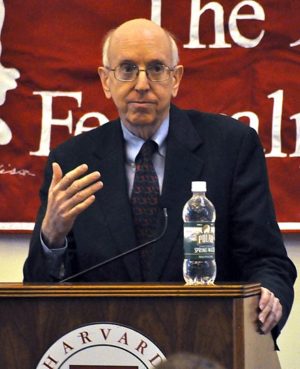On Saturday, Richard Posner retired from his position as the lead judge on the Seventh Circuit Appeals court. For some of his legal peers this may come as a relief, because it means that they won’t have to continue their unequal struggle to keep up with the rulings of the most influential jurist in recent American history. Cass Sunstein, a legal scholar and colleague of Posner’s at Chicago has a nice appreciation of his mentor in which he enumerates the 3,300 judgments that Posner handed down during his time as a judge and explains his significance as a legal thinker. “In the modern era”, he writes, “no one comes close to Posner in terms of the sheer width and depth of his influence on contemporary law”.
Posner’s approach has a deceptively simple starting point: We should focus insistently on the real-world consequences of legal rules.
Suppose that a company has emitted pollution, causing injuries to its neighbors, and the neighbors want to shut the company down; that poor people have purchased refrigerators on credit for what seems to be a very high price, and they want to get out of the deal; that a company has gotten really big, and regulators want to break it up.
In his academic work in the 1970s, Posner asked what different legal rules would actually do, and he used the tools of economics, with its focus on incentive effects and unintended consequences, to answer that question. If the victims of pollution have a legal right to shut companies down, the injuries will stop, but the companies’ workers and consumers will be hurt, which means that courts have to make some tough trade-offs. If poor people can get out of the refrigerator deal, they won’t have to pay that high price, but companies might not want to give credit to poor people in the future.
In countless areas of the law, Posner showed that economic analysis casts a new and often surprising light on questions that people might otherwise try to answer with unhelpful intuitions.
What has always fascinated me about Posner is his role as the most formidable public intellectual in the US since the death of Daniel Patrick Moynihan. For anyone interested in ideas he’s both inspiring and infuriating: inspiring because of the range of his interests and the power of his intellect; infuriating because of his astonishing productivity and his ability to write pellucid prose.
On his intellectual range, Sunstein writes:
It is astounding but true that many of Posner’s contributions have come wholly or mostly from outside of the area of economic analysis of law, with valuable work on (for example) law and literature; on how to deal with catastrophe; on economic crises; on national security threats; and on the federal judiciary itself, and whether it is political, and what it does well and poorly.
On his literary style, the two books of his that I know are Public Intellectuals: a study in decline and his 2011 book on the 2008 banking crisis, A Failure of Capitalism: The Crisis of ’08 and the Descent Into Depression.
Reviewing the latter in the New York Times, Jonathan Rauch observed:
You know that story, and Posner tells it well, with a particular flair for showing how dozens of moving parts interacted. Being Richard Posner, however, he is not content to be an amiable guide through the thicket. His real interest is in finding and detonating grenades in the underbrush.
One is right there on the title page, which flaunts the D-word. The current crisis, Posner maintains, is a depression…
The thing that’s really interesting abut the book is that Posner — in characteristic contrarian style — doesn’t buy the conventional wisdom that the banking catastrophe was (in President Obama’s words) “a perfect storm of irresponsibility and poor decision-making that stretched from Wall Street to Washington to Main Street.” In other words, capitalism is a perfectly good system ruined by crazy, greedy and irresponsible people. Posner disagrees — which, for a guy who has spent most of his career using ideas from economic theory to illuminate legal questions, is remarkable. Instead he argues that what the crisis showed is that markets are not intrinsically the self-correcting mechanisms of economic theory. “The mistakes were systemic”, he wrote, “the product of the nature of the banking business in an environment shaped by low interest rates and deregulation rather than the antics of crooks and fools.” Markets, of their own accord, will sometimes collapse and be unable to right themselves completely for years at a stretch.
That remind you of anyone? For me, it’s back to Keynes, for two reasons. The first is that Keynes had the same insight into the capacity of a market system to reach an equilibrium at a very low level from which it cannot recover. And secondly because Posner, in his ability to change his opinion on something he has believed for years, brings to mind Keynes’s alleged retort to a journalist who accused him of inconsistency: “When the facts change, I change my mind. What do you do, sir?”
(Sadly, this attribution may be apocryphal. Sigh. Some things are too good to check.)
Anyway, the good news that although Posner will not be judging any more, he will still be writing. And still exploding grenades in the undergrowth. More power to his elbow, as we say in Ireland.


